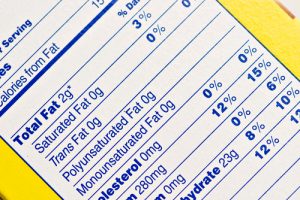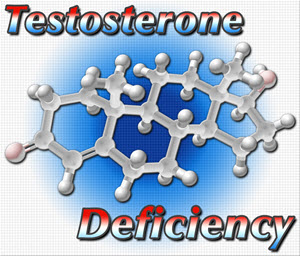 It may seem a bit counterintuitive, especially after decades of being told about the dangers of fat, but dietary fat is absolutely necessary for good health.
It may seem a bit counterintuitive, especially after decades of being told about the dangers of fat, but dietary fat is absolutely necessary for good health.
It's even essential if you're looking to lose weight.
In the 1970s and 1980s, it was taken for the gospel that dietary fat was Enemy Number One when it came to your health and your waistline. In reality, the most prominent issues are processed grains, added sugar, and trans-fats.
For optimal testosterone production in your body, 25% of your diet should include healthy fats.
Video Link: https://vimeo.com/290606971
Video Download: Click Here To Download Video
Video Stream: Click Here To Stream Video
Low-Fat diets were the rage, substituting high volumes of salt and carbohydrates for healthy fat.
Trans-Fats were sold to the consumer as a healthy alternative to regular fats when, in reality, they play a significant role in heart disease and other dangerous conditions like obesity and cancer.
Today, we're learning the truth. It's not fat that is dangerous, but the types of fat we consume and the ratio by which we consume them. Fat is  necessary.
necessary.
It helps maintain hormone balance, and fats are the building blocks of the hormones that allow us to function optimally in our day-to-day lives.
A smart combination of protein and healthy fat is the key to bolstering and maintaining Testosterone levels, burning body fat (which originates primarily from carbohydrates), and building lean muscle.
What are the Types of Fat?
 There are four types of fat: Saturated Fat, Polyunsaturated Fat, Monounsaturated Fat, and Trans-Fat.
There are four types of fat: Saturated Fat, Polyunsaturated Fat, Monounsaturated Fat, and Trans-Fat.
Trans-Fat should be avoided in its entirety, but the other three forms of fat are all critical.
Though the science of nutrition is continually evolving, a good rule of thumb is that you should be drawing equally from all three forms of essential fats.
Saturated Fat – Saturated fat is most commonly associated with animal products such as cream, cheese, milk, and lard, but there are also vegetable oils like coconut and palm oil which have high levels of saturated fat.
Saturated fat has the highest melting point, and is generally solid at room temperature. Though saturated fat is necessary and essential, it's the type of fat we tend to rely on too much, which leads to high levels of “bad” LDL Cholesterol and suppression of “good” HDL Cholesterol.
Polyunsaturated Fat – Polyunsaturated fats are a broad category of fats which have the net effect of helping to control overall cholesterol levels, while not having a substantial impact on HDL Cholesterol. At room temperature, most polyunsaturated fats are liquid.
It's important to include fish in your weekly dietary rotation, because many fish are high in polyunsaturated fat, such as tuna, sardines, mackerel, trout, and salmon. Some other examples are corn oil, sunflower oil, seeds, and nuts.
Omega-three Fatty Acids are a particular category of Polyunsaturated fat.
The  fish listed above are all high in Omega-Threes, as well as other foods such as Brussels sprouts, egg yolks, flaxseed, and walnuts.
fish listed above are all high in Omega-Threes, as well as other foods such as Brussels sprouts, egg yolks, flaxseed, and walnuts.
Omega-Threes are beneficial for the heart because they help control triglycerides in the bloodstream, which helps keep the heart healthy and wards off heart disease.
Monounsaturated Fat – Monounsaturated fats seem to have the highest net benefit of all forms of fat. Monounsaturated fat is associated with higher levels of HDL Cholesterol while also reducing the volume of LDL Cholesterol in the bloodstream.
Significant sources of monounsaturated fat include seeds, nuts, peanut oil, canola oil, and olive oil, as well as margarine produced from such oils.
Benefits of Dietary Fats
Including a Healthy Ratio of Fat in Your Diet Leads to Weight Loss
Research has shown that adopting a diet that includes conscientious consumption of dietary fats leads to increased metabolism and fat-burning power.
This is one of the secrets that was discovered when studying the Mediterranean Diet. In one study, patients on a low-fat diet lost 6.4 pounds on average, while those that ate moderate amounts of fat lost 9.7 pounds.
They also benefited from improved blood sugar levels and had a stronger response to insulin.
Dietary Fat Boosts Libido
 Dietary fat is not only crucial for maintaining metabolism and a healthy weight, but it also promotes sex drive.
Dietary fat is not only crucial for maintaining metabolism and a healthy weight, but it also promotes sex drive.
That's because the fats that we eat are used in the process of producing essential hormones such as Testosterone. In both men and women, Testosterone is absolutely necessary to promote feelings of sexual desire.
Scientific research has clearly shown that diets low in fat correlate directly with suppressed Free Testosterone levels. One study showed that a low-fat diet led to 12% lower Testosterone levels.
When combined with other risk factors for Low Testosterone, 12% is a massive drop in production.
Dietary Fat Elevates Your Cognitive Processing and Brain Health
Omega-three Fatty Acids have some extraordinary properties, as we touched on earlier.
For example, they appear to have a dramatic impact on brain health. A diet high in Omega-Threes is scientifically associated with a lower risk of dementia as well as a barrier against depression.
There is also evidence that dietary fat has substantial positive effects on focus and memory as well.
Dietary Fat Improves Nutrient Absorption and Utilization
Our bodies require a variety of different vitamins and minerals to function, and they all have their own unique and essential effects, but many need dietary fat to be effectively absorbed.
Vitamins K, E, D, and A all require dietary fat to be absorbed by the intestines; otherwise, they will pass straight through your system.
Dietary fat is a boon to health and entirely beneficial when consumed smartly and conscientiously!
Reference
Contact Us Today For A Free Consultation

- Testosterone for Women [Last Updated On: December 1st, 2023] [Originally Added On: December 29th, 2013]
- Testosterone Androgen [Last Updated On: December 11th, 2023] [Originally Added On: December 29th, 2013]
- Testosterone and Body Building [Last Updated On: December 14th, 2023] [Originally Added On: December 30th, 2013]
- Testosterone Levels [Last Updated On: December 6th, 2023] [Originally Added On: December 31st, 2013]
- Testosterone Gel, Cream, and the Testosterone Patch [Last Updated On: November 28th, 2023] [Originally Added On: December 31st, 2013]
- Buy Testosterone | Types of Testosterone Replacement Therapy Programs, Injections, Cream and Gel [Last Updated On: December 13th, 2023] [Originally Added On: December 31st, 2013]
- Buy Testosterone Injections Online, Testosterone Prescription for Low T, Testosterone Replacement Therapy [Last Updated On: October 16th, 2020] [Originally Added On: January 1st, 2014]
- Aging and Testosterone Replacement Therapy [Last Updated On: December 12th, 2023] [Originally Added On: January 3rd, 2014]
- What Causes Low Testosterone [Last Updated On: December 10th, 2023] [Originally Added On: January 7th, 2014]
- Hormone Levels in Men [Last Updated On: December 4th, 2023] [Originally Added On: January 12th, 2014]
- Hormone Level Testing [Last Updated On: November 29th, 2023] [Originally Added On: January 13th, 2014]
- Types of Testosterone Products and Delivery [Last Updated On: December 8th, 2023] [Originally Added On: January 22nd, 2014]
- Testosterone Therapy Helps Men with Low-T Ward Off Prostate Cancer [Last Updated On: May 29th, 2024] [Originally Added On: December 29th, 2019]
- Testosterone Deficiency and Low-T at Epidemic Levels Among Men in the United States [Last Updated On: May 27th, 2024] [Originally Added On: May 17th, 2020]
- The Effects of Testosterone Therapy on Male Patients -- Who Should Use Testosterone? [Last Updated On: December 20th, 2023] [Originally Added On: June 16th, 2020]
- Does Ibuprofen Contribute to Low Testosterone? [Last Updated On: January 27th, 2024] [Originally Added On: June 20th, 2020]
- The Link Between Testosterone and Lower Rates of Autoimmune Diseases Among Men [Last Updated On: January 30th, 2024] [Originally Added On: June 21st, 2020]
- Weight Cycling and the Problem with Crash Dieting [Last Updated On: April 8th, 2024] [Originally Added On: July 30th, 2020]
- Reexamining Bio-Identical Testosterone Therapy [Last Updated On: June 18th, 2024] [Originally Added On: August 12th, 2020]
- Understanding how Muscle and Fat Impact Body Mass, Weight, and Health [Last Updated On: April 15th, 2024] [Originally Added On: August 25th, 2020]
- The Role of Nitric Oxide in Cancer Proliferation And Prevention [Last Updated On: May 3rd, 2024] [Originally Added On: August 26th, 2020]
- Understanding Heartburn in the 21st Century [Last Updated On: April 24th, 2024] [Originally Added On: August 28th, 2020]
- What is Erectile Dysfunction? [Last Updated On: April 20th, 2024] [Originally Added On: August 30th, 2020]
- Sermorelin Acetate Drug Information [Last Updated On: April 7th, 2024] [Originally Added On: August 31st, 2020]
- Exercise and Mental Health [Last Updated On: April 5th, 2024] [Originally Added On: September 1st, 2020]
- The Importance of Proteins, Carbs, and Fats [Last Updated On: March 11th, 2024] [Originally Added On: September 2nd, 2020]
- Low-T Treatment Before and After -- How Testosterone Therapy Improves Vitality [Last Updated On: April 9th, 2024] [Originally Added On: September 6th, 2020]
- Changes to LabCorp Guidelines for Low-T Diagnosis and How They Impact Your Treatment [Last Updated On: July 14th, 2024] [Originally Added On: September 22nd, 2020]
- The Effects of Testosterone on Asthma Prevalence Among Men and Women [Last Updated On: February 19th, 2024] [Originally Added On: October 6th, 2020]
- 7 Exercises to Elevate Testosterone Levels [Last Updated On: June 13th, 2024] [Originally Added On: October 10th, 2020]
- Vitamin A is Essential for Good Health - Are You Getting Enough ? [Last Updated On: April 16th, 2024] [Originally Added On: October 14th, 2020]
- Testosterone and Diet – How to Support Testosterone Levels with Healthy Eating [Last Updated On: June 7th, 2024] [Originally Added On: October 29th, 2020]
- The Significance of Telomeres in Stem Cell Treatments [Last Updated On: March 16th, 2024] [Originally Added On: November 27th, 2020]
- The Influence of Testosterone on Protective Mating Behaviors in Men [Last Updated On: January 25th, 2024] [Originally Added On: December 6th, 2020]
- The Role of Testosterone in Women's Health [Last Updated On: December 24th, 2023] [Originally Added On: December 7th, 2020]
- Testosterone Promotes Bone Health and Can Help Treat Osteoporosis [Last Updated On: February 15th, 2024] [Originally Added On: December 17th, 2020]
- The Relationship Between Testosterone and Cortisol [Last Updated On: April 2nd, 2024] [Originally Added On: December 19th, 2020]
- The Importance of Sex Hormone-Binding Globulin (SHBG) for Healthy Testosterone Levels [Last Updated On: March 9th, 2024] [Originally Added On: December 28th, 2020]
- 12 Health Issues That Can Kill Libido and Limit Sexual Performance [Last Updated On: May 23rd, 2024] [Originally Added On: January 3rd, 2021]
- 4 Foods to Boost Your Testosterone Levels [Last Updated On: February 7th, 2024] [Originally Added On: January 4th, 2021]
- Low Testosterone Symptoms [Last Updated On: December 31st, 2023] [Originally Added On: January 7th, 2021]
- Is Male Menopause Real? The Science of Andropause [Last Updated On: January 15th, 2024] [Originally Added On: January 11th, 2021]
- Relieve Fatigue and Increase Energy with Testosterone Replacement Therapy [Last Updated On: January 16th, 2024] [Originally Added On: January 16th, 2021]
- How to Administer a Testosterone Injection -- Low-T Injection Guide [Last Updated On: February 28th, 2024] [Originally Added On: January 17th, 2021]
- Testosterone Levels Associated with Serotonin Activity in the Brain [Last Updated On: March 26th, 2024] [Originally Added On: January 19th, 2021]
- Grumpy Old Man Syndrome – Causes and Treatments [Last Updated On: June 8th, 2024] [Originally Added On: January 22nd, 2021]
- The Effects of Beer on Testosterone Production and Gynecomastia [Last Updated On: March 21st, 2024] [Originally Added On: January 30th, 2021]
- Testosterone Frequently Asked Questions [Last Updated On: February 6th, 2024] [Originally Added On: February 26th, 2021]
- Testosterone Supplements: Vitamin and Amino Acid Pills Versus Real Testosterone [Last Updated On: November 21st, 2024] [Originally Added On: March 1st, 2021]
- Testosterone Side Effects, Risks, Dangers and Negative Effects [Last Updated On: November 7th, 2024] [Originally Added On: March 2nd, 2021]
- Testosterone for Men [Last Updated On: February 20th, 2024] [Originally Added On: April 13th, 2021]
- Testosterone Testing [Last Updated On: November 9th, 2024] [Originally Added On: May 7th, 2021]
- Hormone Replacement Therapy: Commonly Asked Questions [Last Updated On: February 20th, 2024] [Originally Added On: June 16th, 2023]
Word Count: 932




















